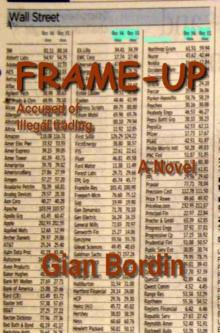- Home
- Gian Bordin
Frame-Up Page 3
Frame-Up Read online
Page 3
It is nearing midnight by the time a taxi deposits us at the entrance of my building. During the ride, I hardly responded to Gary’s enthusiastic comments about James Bond’s exploits. We go to bed, it feels to me, almost like a long-married couple, hardly looking at each other, engaged in an indifferent ritual of copulating the moment we are under the eiderdown. Not even a kiss. It leaves me hanging, frustrated.
I wake next morning with a dry mouth and a headache from too much alcohol, wishing that the man turning his back to me had left discretely some time during the night, so that I might enjoy a leisurely morning, a hot, strong cup of espresso and a croissant, followed by a long, luxurious bath. Instead, I promise myself to be pleasant to my boyfriend and try to mend a relationship that has suddenly revealed itself so fragile. It occurs to me that Gary doesn’t really cope well when things don’t go his way. I’m reminded of our holiday on the Amalfi coast, of how his mood easily turned sour over insignificant mishaps or irritants, such as taking the wrong turn leading down rather than up in the steep villages rising from the sea and having to back up again, or the boat back from Capri being late by half an hour.
Monday, 20th October, 10:55 a.m.
Once more I’m summoned to Garland’s office. This time he doesn’t bother to rise, but remains slouched in his chair, as if he wanted to make himself smaller, as if he hated what he is going to do next.
"Miss Walker, you have put me into an impossible position. I am being threatened by your client over the Sanvino debacle."
You mean my ex-client, but I keep quiet in heavy anticipation of what is coming next.
"He wants that our firm compensate him for his loss, which obviously my board would never agree to. The only thing that I can offer him is to sever our ties with you —"
"You mean, fire me?"
"Yes, I have no other choice." He straightens himself and puts both hands on the desk. "Frankly, the way you made the Sanvino transaction is so out of character with your previous performance that I don’t know anymore whether Carvaggio’s accusations are true or not."
"What do you mean? Are you accusing me of having defrauded Ventura deliberately?" I ask, startled by my aggressive tone.
"Yes, the more I think about it, the more this appears to be the only explanation. Even involving your boyfriend for confirming the rumor, and I have checked the rumor out with a number of people — most dismissed it as lacking credibility — even that now looks suspicious. He could well have been your accomplice."
Do I hear him correctly? Not only am I going to be his scapegoat, but he’s dragging Gary into it too. I break out in cold sweat and take a few deep breaths.
"You have no reply to that?" he says with a rising pitch, when I don’t immediately repudiate his accusations.
"But what you say is absurd. I have done nothing fraudulent. All I can be accused of is that I misjudged the situation." As an afterthought I add: "Please, sir, keep Gary Buxton out of this. All he did was to ask around at Goldsax whether they had heard of that rumor."
"It’s out of my hands. It’s now a police matter."
He rises, so do I. I become aware that I’m holding my breath and tightly squeezing my hands together, as if to prevent myself from flooring him with a single Aikido chop. He doesn’t give me time to respond.
"Miss Walker, your employment with Lewis Stockbrokers is terminated as of this moment. Until the police have cleared this matter, I am compelled to put a freeze on your commission account, as well as hold back as surety all your shares in deposit with us. I’m sure you understand the reasons for this. You have fifteen minutes to clear your desk and leave the building. You are forbidden to touch your computer." It sounds rehearsed. "And don’t forget to hand in your building security pass to Maggie." He turns his back to me and sits again at his desk.
I remain standing there, dumbfounded by the suddenness of it.
"Miss Walker, there is nothing more to discuss," he comments when he sees me.
Rather than go to my desk, I again seek refuge in the ladies’ room. I look at myself in the mirror. Early last week, I was looking forward to a hefty commission payout. And now I might never see any of it, nor any of my close to four hundred thousand pounds worth of shares. Even if I’m going to be cleared of all allegations, Garland might still try to use them for partial compensation of Ventura’s losses. I would have to fight a costly court battle and the outcome is by no means certain to go in my favor.
And what about Gary? We partially mended our relationship over the weekend, but I still figure that it remains fragile. I fear that getting dragged into this may well drive him away for good.
How can a good thing turn so quickly into disaster? It surprises me though that my eyes remain dry. All the mirror reflects is somber hurt for the injustice I’ve been dealt. Admittedly, I made a bad decision, but I’m no crook. I allowed myself to be let astray by Long. Did he feed me that rumor deliberately, knowing that it lacked credibility? Would he have been that mean? If I dismissed the guy as an immature twit previously, I now feel nothing but scorn for him. Then I catch myself. Wallowing in self-pity and hatred is only going to sap my energy. I must take hold of the cold determination not to crumble in the face of adversity — the same determination that pulled me through the trying years during and after my mother’s divorce.
My career at Lewis might be over, but I’m going to fight. I’m going to clear myself of this absurd accusation. I will get myself a good lawyer. As I collect my personal possessions from my cubicle, these words resonate in my mind like a mantra. I will clear myself; I will clear myself.
At this moment the likelihood of never getting another position as stockbroker is the least of my worries. The money is good, but the predatory nature of stock exchange trading and the constant pressure are far less palatable, not to mention the widespread sick culture in brokerage circles of bending or circumventing the rules against insider trading.
From hints dropped by several of my colleagues I know that Lewis is no exception. Garland, Long, and others cultivate links with clients, captains of industry, company directors, property tycoons, who are more than happy to brief them about the performance and planned developments of their companies and doing so even during the so-called closed period — the two months prior to making public the annual financial results or financially significant trading developments. Brokers, as well as company insiders, are by law prohibited from taking advantage of such information by trading on their own account. It is obvious that the brokers who are first to act on such information or even a rumor, such as a possible takeover bid, can cash in on that by buying up shares and then selling them after the share price has risen. Even if the rumor is false — and a few brokers plant them deliberately — this can be exploited as long as the broker offloads the shares again before the rumor has been debunked. Tipping off a financial journalist, keen on hot publishing materials, will help to ramp up the share prices, as so-called ‘mug punters’ and gullible speculators act on the rumor.
It is far too easy to get around the prohibition against insider trading. You let a broker at another firm carry out the deal — an accomplice with whom you split the profits and for whom you return the same ‘little’ service. There is practically no chance of getting caught by the Financial Services Authority, the large volume of trading on the stock exchange providing an effective screen.
Monday, 1:20 p.m.
Back in my apartment, the first thing I do is to phone my father’s office. He is a lawyer, albeit of the corporate type, but he still is the best person to advise me. It’s also opportune that he hears of my trouble directly from me rather than through second-hand gossip. His secretary promises that the moment he returns from lunch she will pass on the message that he urgently calls me back at my apartment number.
Next I dial Gary’s direct office number from my cell phone. I want to make sure my land line is kept free, should my father call back promptly. I owe it to Gary to warn him of what happened, of Garland’s accusa
tions, particularly his suspicion that he is my accomplice. The very thought of that makes me irate. Accomplice of what? Nothing happened! I’m innocent, and Garland is simply using me as a scapegoat to appease Carvaggio. Nor do I believe that Carvaggio will let himself be that easily appeased. From my dealings with him, I guess that he has to be taken by the horns and told in no uncertain terms that since he approved the sale, this is the end of the matter. Lewis will lose the Ventura account, but so be it. I never felt really comfortable about this client. The very fact that the outfit is registered in Liechtenstein, a notorious haven for tax evaders and money launderers, but operates out of Milan doesn’t look kosher. I once searched for their location on the Google street view map — a villa somewhere in the eastern suburbs, surrounded by a high stonewall with glass shards embedded on top. Rather suspicious.
Gary isn’t yet back from lunch. So I try his cell phone. He answers, apparently just on his way to his desk. I tell him that I’ve bad news. He cuts me off, asking me to call back in a minute. I guess that he is going to their conference room, to be alone so that nobody can infer anything from his answers. I wait and then hit the recall button.
"Gary, I got fired this morning. Garland accused me of insider trading and defrauding Ventura. But he also hinted, and that’s what’s really upsetting, he hinted that he thought you were my accomplice."
"Shit, the bastard."
"I’m really sorry, Gary —"
"Being sorry can’t even come close. I’m utterly annoyed with you, no, more; I’m fucking pissed off. You got me into this shit. You now also get me out again. You hear me?" I’ve never heard Gary use foul language like this.
"How can I?"
"You tell that fucking detective that you lied about having sought confirmation of that rumor from me, that it was somebody else."
"But both Garland and Long know that it was you."
"I don’t care. Just do it."
"Gary, are you serious? You want me to perjure myself? I’m already in trouble."
"Yes. It’s all your fucking fault. For what I care, you can tell them you never sought any confirmation at all, that you simply made that up to protect yourself."
I cannot believe my ears. Is this the same man with whom I’ve been in a loving relationship for almost two years? With whom I went on a fun vacation to Italy? With whom I made love a hundred times or more? His reaction seems completely irrational. I try again: "And what about your response to the woman detective when she questioned you? Didn’t you tell her that you confirmed the rumor?"
"No, I’m a bit more clever than that. I remained deliberately vague. I told her that we call each other at least once a day and that I don’t remember if this ever came up. So I’m in the clear unless you put me in the shit. It’s your duty to undo the damage you’ve already done to me."
"Gary, I am not going to perjure myself. I have done nothing criminal or illegal," I emphasize each word, "and I’m not starting now. Nor have you done anything wrong."
"I insist that you get me out of this shit. You owe me that … You hear me?"
We both remain silent for several long seconds. How can he ask me to do this? The person I’ve counted on to be my support now turns against me. For once, I’m lost for words.
"Are you still there?" he questions gruffly.
"Yes."
"Look Cecilia, that’s the only way to get me clear. You have to do this."
I notice that this is the first time in our conversation that he calls me by name.
"You owe this to me. If you don’t retract your statement, I don’t know what I’m going to do. I may flatly deny that you ever mentioned this … and, come to think of it, I won’t hesitate to point out that you’re often economical with the truth."
This is it! I press the end-call key. I’m livid, hurt, suddenly apprehensive of what is coming next. I’ve just lost my job. I’m accused of fraud. And now I also seem to have lost the man I viewed only the other day to become my partner for life. Things are going from bad to worse. Are the police already on the way to arrest me? Then I remind myself that I’m innocent, that I have to fight this and get out of it unscathed.
Keeping up my strength is part of it, I remind myself. So, although I don’t really feel like eating, I search the refrigerator for something palatable. I find a tomato, slightly overripe, half a container of cottage cheese, and an avocado, its flesh discolored brown, some of the spots turning indigo, smelling fermented. I throw it into the rubbish. It reminds me that I need to stock up. I cut up the tomato, mix it with the cottage cheese, and flavor it with some liquid organic vegetable condiment I bought in a health food store on my last trip to Lugano. While I eat, not really tasting it, I replay my conversation with Gary. I’ve never deliberately lied to him. How could he say that I’m economical with the truth? I feel bruised. And he doesn’t care in the least about my predicament. He’s only concerned about his precious self. It hurts. And there I thought he loved me, as I love him, maybe not the all-consuming infatuation of a Mills and Boon novel, but a solid commitment. He revealed a side of himself that he kept mostly well hidden. Did it need adversity or a crisis for it to come out? Is this a truer picture of what he would be like in the long run than what he let me see so far? And would I ever be able to trust him again after this? I doubt it and it makes me sad. It feels like this important aspect of my last two years has been a failure, a dead-end.
Suddenly I yearn for a close and intimate girl friend, one who would listen to me, one to whom I could confide my innermost thoughts and who wouldn’t judge me; who would take me the way I am; who would be supportive if I need comforting; who would help me laugh at myself; one for whom I could also be the same kind of friend. But when my mother took me to Switzerland, I left my only real highschool friend in South Kensington, nor might that friendship have survived beyond highschool or developed into a close and intimate one. Back in Montagnola, suddenly thrown into Italian, any spare energy I could muster I felt had to be directed toward looking after my brother. At that point in our life, Italian was largely a foreign language for both of us. Since my father didn’t speak it, even our mother didn’t use it at home. True, we heard her speak Italian to Swiss relatives and the occasional Italian acquaintance. Our ears were somewhat attuned to it. But keeping up with my highschool studies in an unaccustomed language demanded extra effort, and I was unhappy to be no longer at the top of my class, as I had been in England. Later, at university, determined to get top grades, I juggled my energies between studies and continued support of my brother, which was getting more and more onerous as he got into his late teens. So, again, any friendships remained superficial. And the competitive dog-eat-dog climate of the MBA program almost precluded forming close friendships with both sexes. By then I was also looking for sexual fulfillment in my relationships.
Don’t wallow in self-pity, the survivor in me admonishes once more. Becoming despondent won’t help. Maybe with a bit of distance Gary may come to his senses, regretting his outburst, wanting to make up. But right now, I’ve more pressing things to worry about. I force my mind to think about what I need to tell my father. He likes people to be precise and to the point and becomes easily impatient if they ramble on, and at this moment I need his goodwill.
After my return to London, my father and I mended our relationship. By that time I had come to the conclusion that there was no reason why my life should be ruled by what had happened between my parents, that neither my brother nor I carried any responsibility for their divorce. Nor did being on good terms with my father imply that I abandoned my needy mother. Dad invited me regularly for meals. I even discovered that he hadn’t really traded my mother for a younger, shapelier model. Although eight year younger than my mother, Lucy is no beauty, but she has a pleasant, tranquil homeliness about her and is a good cook of traditional English fare, features that my father must have appreciated after my mother’s erratic behavior and her esoteric southern cuisine. In fact, I learned to like Lucy and found my two l
ittle stepsisters a delight. It felt affirming that my father was proud of how well I did at university and of my successful career as a stockbroker. I think he recognizes in me some of his own traits: intelligence, determination, often to the point of stubbornness, reliability, and loving a challenge. He once mentioned that he would have loved a son with my character.
The kitchen clock shows 2:25 p.m.. I’ve already drunk my second espresso and am getting anxious. It is crucial that I consult with a lawyer before the police come knocking at my door.
Monday, 3:05 p.m.
No phone call yet, only the buzzer of the building entrance intercom hauling me out of the trance I’ve slid into. I answer.
"DI Willis and DS Somes. Miss Walker, please let us in. We need to have another talk at the police station."
Are they going to arrest me? And dad hasn’t called yet, nor do I have a lawyer. My anxiety rises sharply. But there is nothing I can do. I press the release button for the front door. "Come up. Unit 37, level 7," I reply.
My father must have sensed my panic or so it seems to me when the phone rings a second later. I rush to leave the apartment door ajar and then sprint into the kitchen to answer the phone.
"Miss Walker, I will connect you with your father," I hear the voice of his secretary.
I don’t give dad even time to say hello, and instead immediately launch into my story and the police summoning me again to the station. I hear the knock at the front door, quickly cover the mouthpiece of the phone, calling out: "Come in. I’m on the phone in the kitchen."
My father chides me. "Cecilia, why didn’t you call me earlier, right when it happened? You should have known better than to talk to the police without a lawyer."
"Because I didn’t expect this thing to blow up like this. The accusations are absurd. I’ve done nothing criminal or illegal, but now I need a lawyer. Please, help me, dad. Two detectives are already waiting to take me away."

 Chiara – Revenge and Triumph
Chiara – Revenge and Triumph Kidnapped and a Daring Escape
Kidnapped and a Daring Escape Yuen-Mong's Revenge
Yuen-Mong's Revenge Frame-Up
Frame-Up Summer of Love
Summer of Love